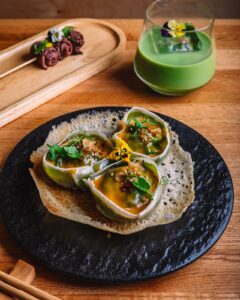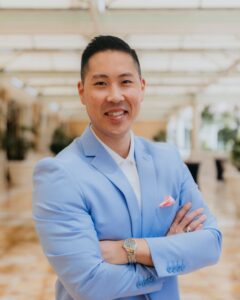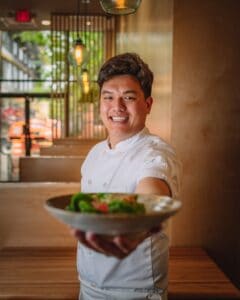Zach Heng is an FSU Information Technology (IT) alumnus and a self- proclaimed foodie that has become a co-owner of the restaurant, Yunnan By Potomac, with his partner Chef Shao Bruce.
“This role bridges everything I care about: heritage, experience design, food, and people-first leadership,” Heng said.

Previously, Heng founded his own company, The Heng Group, while continuing to pursue a corporate career in human resources and technology that spans nearly two decades across global brands like Accenture, Deloitte, Booz Allen Hamilton, and Vanguard including leadershiproles in Hacking HR, Fruit Street Health, and Ascend. Throughout his career, Heng wanted to find a way to have a more creative influence in his work. Yunnan By Potomac was exactly that. It’s rooted in culture, exploring the impact of the Yunnan province and showcasing a combination of heritage and identity. Heng describes how “we’re not just serving food – we’re curating experiences and sharing the story of Southwest China in a way that sparks curiosity, pride, and connection.”
 With such a stark shift in Heng’s professional path, it brings attention to the partnership between the two co-owners of Yunnan By Potomac and how this impacted the trajectory of the restaurant. In spring 2020, during the early days of the COVID pandemic, the two partnered on a philanthropic project delivering meals to frontline healthcare workers through Ascend. This was only supposed to be a one-time partnership, then soon-after turned into a long-term relationship as one of Heng’s first marketing clients.
With such a stark shift in Heng’s professional path, it brings attention to the partnership between the two co-owners of Yunnan By Potomac and how this impacted the trajectory of the restaurant. In spring 2020, during the early days of the COVID pandemic, the two partnered on a philanthropic project delivering meals to frontline healthcare workers through Ascend. This was only supposed to be a one-time partnership, then soon-after turned into a long-term relationship as one of Heng’s first marketing clients.
When invited to join the business nearly 5 years later, it was a decision Heng would be confident in making. “We both wanted to build something that honored our roots while pushing the boundaries of what Asian American cuisine could be in America. Our partnership formed out of mutual respect – his culinary mastery and my background in brand building and business strategy made for a powerful match,” Heng said.

Heng began his professional journey at the Florida State University College of Communication and Information (CCI), which “taught me the power of storytelling and human connection through servant leadership – skills that have defined every stage of my career. I also developed the confidence to lead, to build coalitions, and to represent communities with clarity and purpose. That training combined with real-world experience through community-based work facilitated by the CCI faculty laid the foundation and shaped the leader I am today.”

